Reports from the Port
Here are two articles by eyewitnesses, one by Marxist László Molnárfi and the other by anarchist Alexander Rakhmetov, analysing the attempted blockade of Dublin Port by pro-Palestine activists on October 4th 2025, the ensuing violent suppression by Gardaí, and the next steps for the movement.
October 4th 2025 – A Rupture Point?
László Molnárfi
On October 4th 2025 at 1pm, a group of about [REDACTED] people organized in the [REDACTED] network, a loose coalition of students, activists and workers, diverted around 300 from the 25,000-strong crowd at the protest march for Palestine organized by the Ireland-Palestine Solidarity Campaign (IPSC). Splitting at O’Connell Street after the bridge, turning left alongside the Liffey River, we made our way to the chosen target: the Dublin Port, the nexus of the Irish economy, in order to pressure the State to sanction Israel in the face of its genocidal actions in Gaza. After 2 years of ritualised marches, symbolic protest and hearing the same speeches over and over again at the Dáil, this was a rupture within the movement, bifurcating the forces of the moderate-dominated IPSC towards a radical direction. A rupture point in which tensions between divergent tendencies become accentuated to the point of visibility, what Alan Badiou calls an ‘Event’, a rip in the fabric of the social order which unearths future possibilities. It is often the case that political tendencies hide themselves in the name of ‘unity’, which does the entire movement a disservice by indefinitely deferring eruptions of tactical-strategic debate, and the corresponding social forces which they mobilise.
Not without infighting, the moderate stewards of the IPSC with megaphones, shouting over and blocking the radical faction, attempted to prevent people from crossing over. In a tense confrontation, observed by activists, shouts of “What the fuck are you doing? You think you are the vanguard? Fuck off and stop disrupting our march!”, “Fucking melts!” and “Stop dividing the march!” were heard. This is reminiscent of the November 3rd 2010 protest against the State increasing third-level fees, in which the moderate wing led by the Union of Students in Ireland and the radical wing led by revolutionary socialists entered into confrontation over the occupation of the Finance Department and its brutal suppression by Gardaí. In a movement, a plurality of organisations; in each organisation, blended of leadership bi-directionally linked to a support base across branches with varying levels of centralization mechanisms, ever-shifting, there lies beneath the surface divergent tendencies, moderate and radical politics.
The day before, a revolutionary mood was clearly in the air, as concerned citizens began to understand the necessity of disruptive mass action. The interception of the Gaza flotillas which has seen 16 Irish citizens detained by the Israeli authorities undoubtedly electrified the movement, altering subjectivity, propelling the public’s anger. It was, as such, suggested that the march should be diverted so as to capture its energy towards militant action. The ‘hidden transcript’ was activated, with heightening of contradictions, as social media posts by a wide range of activists called to defy the moderate segment of the IPSC leadership, ideas which were already circulating amongst the fringes of the movement, who found the respectful, peaceful marching and orderly cooperation with Gardaí to be a co-optative bottleneck on pro-Palestine forces. The youth, student and non-student alike forming an organic vanguard of this radical flank positioned to the Left of the mainstream, Student Neutrality Front (SNF), Connolly Youth Movement, campus BDS groups as well as the elder, Social Rights Ireland, IPSC Derry, IPSC Kildare, IPSC Roscommon and IPSC Carlow were amongst the first who questioned the direction of the broader movement on a theoretical level, some of it diffused via social media, months earlier.
On October 1st, a smaller group of about 150 had already blocked the port, bringing Dublin to a standstill, which ended in Gardaí using physical force to remove the obstruction. It had become clear that this is a pressure point for the State, allowing a direct challenge to the process of trade-production, “just-in-time” delivery systems and logistics mechanisms of Capital, and due to the trade union movement lagging behind, combined with the urgency of destroying the Zionist entity, which is but an overgrown military outpost that calls itself a State and feasts upon the land of Palestine like a mechanical parasite, necessitated protestors to take matters into their own hands. The [REDACTED] network, in turn, cemented these radical segments of the movement, including those leaders within IPSC branches who were dissatisfied with its direction, and, as such, on this day, erupted into the mainstream by posing a direct challenge to the liberal consensus. Hence, Ireland, with its widespread, if passive, support for Palestine, found its footing amongst the militancy of other European countries, such as Italy and Greece, in confronting the forces of Zionism.
On October 4th, revolutionary socialists of all types, such as Trotskyists, Marxist-Leninists, Maoists and anarchists took part in the diversion of the march dispersed across various groups. People Before Profit (PBP), the Cliffites, as we waved to them to follow us from the pavement, signalled that they were to follow later after the main speeches were to be concluded, a promise which was met with disapproval but was lived up to a few hours later, although one wonders if even more numbers could have been secured had they turned at the bridge. Compared to the earlier port blockade, as we were marching, there was a definitive public outpouring of support, with cheers, thumbs ups, clapping from the honking cars and trucks all the way down our route. Being already inscribed to public consciousness, on the back of the main march, October 1st and October 4th differed in content, if they were the same in form, harder to blame on a minority of militants, as it became a mass disruptive action. Looking back from the midst of the march towards the port, the numbers swelled, and we were confident in our success, crossing over to the other side of the Liffey River using the Samuel Beckett Bridge. The State forces, protectors of Capital, and through it, of Zionism, anticipating our direction, quickly assembled, with around 15 officers, blocking our path after we traversed the Scherzer rolling lift bridge.
The Irish political scene, even on the Left, upholds respectability culture and symbolic action, hence the overwhelming feeling of solidarity which came over us as we linked arm-in-arm to push through the imminent line of Gardaí. “Stick together!”, the crowd shouted. There was a trepid understanding that what we were about to do was a deviation from the ordinary, which would shift the dynamics of the domestic pro-Palestine movement towards a militant direction, crossing a line in the sand. Chants of “Free Palestine!”, “One Solution, Intifada Revolution!”, “Gardaí, RUC!”, ““Who do you serve, who do you protect?” “Fuck the Gardaí”, “Fuck the Free State!”, “Death, death to the IDF!” spontaneously arose, from all participants of the crowd, being started and stopped haphazardly, differing from tightly-controlled marches with appointed leaders. They had made a mistake – leaving one narrow gap on the street open between parked Gardaí cars – and we quickly shifted to run through it. It was an ecstatic moment, as the force-field of the State was temporarily subverted, a crack in which the possibility of another world shines through. “Whose streets? Our streets!” became the chant reverberating through the area. The second Gardaí line, further down the street, was easy to pass, as they, unprepared with just 10 officers, began retreating the moment we linked arms.
When we reached the North Wall entrance to the port, a regiment of 30 officers awaited us, batons and pepper spray ready, as we almost broke through them, linking our arms around one another once again, pushing, in order to enter the streets where the on- and off-loading of containers arriving to and departing from Ireland was taking place. Pepper spray, cries of panic followed, comrades falling onto the pavement, water, milk and saline being poured by others into eyes, retreat. The liberal mask of the State had fallen, transforming the relationship between protesters and the authorities, poised to spark a militant mass movement as pictures and videos of the incident circulated on social media. While there had been scuffles and arrests prior to this day, the scale had far surpassed anything seen before, which could radicalize new layers of the population. This is precisely the cause of the State’s reaction, as the protest risks veering into thousands upon thousands emboldened masses adopting the approach. The consequent spill-over effect into the trade unions and their constituencies, jumpstarting labour strikes, could pose a real, sustained threat to economic stability, desired by the ruling class in their drive to counteract the tendency of the rate of profit to fall, and thus to the State. The State, which mediates between the ruling and the working classes but is over-determined to lean towards the former than the latter, would be forced to grant concessions of a nature unacceptable to its ultimate masters. Despite the viability of multinationals and the job market thereof being linked to the foreign policy of the United States, Ireland is the weakest chain in the link of Zionism in Europe due to passive support for the cause of Palestine, and if that chain is broken by the fiery hammer of popular will, other countries will follow in adopting boycott, divestment and sanctions on a governmental level, like the 1984-1987 Dunnes Store strikers activating a tipping-point in the case of apartheid South Africa. Up to this date, it had only been the nationalist-populist forces in Ireland which have practiced the politics of aggressive excess, whereas the far-left had aligned themselves with liberal respectability. “Zionist scumbags!”, “Fuck you!”, “Free State fuckers!”, showing an anti-imperialist understanding, next to the Reichian-libidinal “Who is your daddy? It is Israel!” chants erupted, alongside passionate impromptu speeches denouncing the crony capitalist class of Fine Gael and Fianna Fáil and its Gardaí protectors. As tensions calmed, the gathered engaged in discussion, smoked and danced to the tune of Bella Ciao, Come Out Ye Black and Tans and other left-wing resistance songs. Suddenly, a stuck trucker beeped, rolled down his windows and raised his fist, expressing solidarity, to which cheers erupted from the crowd. The alliance of students, workers and activists was being built step-by-step, little interactions which could snowball to meet the task set before us by history to dismantle the Zionist entity, aided by the biscuits and tea and the SNF flyers geared towards the general public. This was done due to the recognition that repeated port blocking affecting traffic throughout the city, no doubt, could alienate the working class, and should it falter in broad support, will become a replica of Just Stop Oil, so it must always be stressed that the same system which impoverishes working class communities also funds weaponry for Israel at the taxpayer’s expense. Encouraged by the arrival of the PBP contingent from after the main march bringing another 100 people, it was decided to flank the Gardaí by taking another route to the port.
The procession was inspiring, with people chanting, singing and talking to members of the public in their cars and waving to those on their balconies with Palestine flags hung. This enthusiasm was short-lived. Upon arrival at the East Wall entrance to the port, a row of about 35 officers awaited, their pepper spray refilled, batons and wall-shields at the ready. We attempted to break through the barrier, standing up to this restriction on the right to protest, all for Palestine, but it was no match for the armed forces of the State. The Sergeant commanded, and his pawns marched ahead, people retreated, fell to the ground, screaming, tended to by comrades, laying on the ground in the rainfall as the Gardaí wielded their weapons, and in what seemed like an instant but was around 3-5 minutes later, they charged ahead, despite the pleas to wait while those wounded could recover. Scattering. Shouts of “Shame!”, ever-louder than before, reverberated. A mobility aid was seen left behind as people rushed to escape the charge. In one picturesque moment, calling to mind a Renaissance painting, two comrades waved the Palestinian flag while facing the lapdogs of the State, one of them shirtless due to the heat of being hit with pepper spray, clothes covered with its orange, as they retreated from Gardaí, and in another, an onion hit a member of the peace as an expression of dissent with a humorous twist. Not to mention, the wind was such that a younger Garda, the poor bastard, pepper sprayed himself! The crowd, lacking the equipment and planning needed for militant resistance, such as eyewear, armor and ad-hoc barricades, dispersed. In total, 3 people were arrested, and dozens suffered injuries.
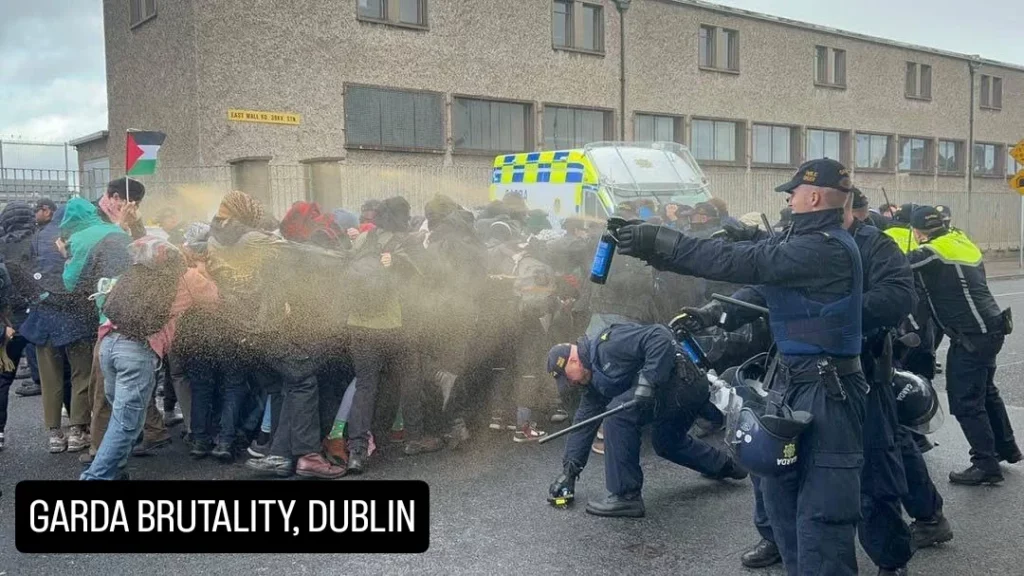
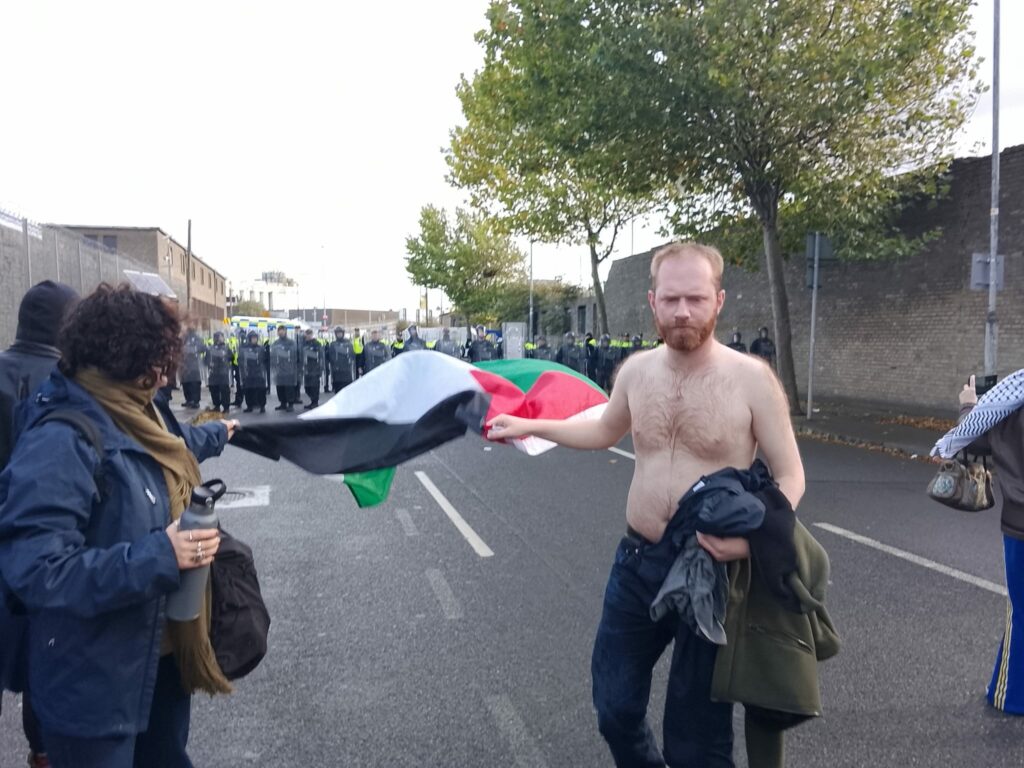
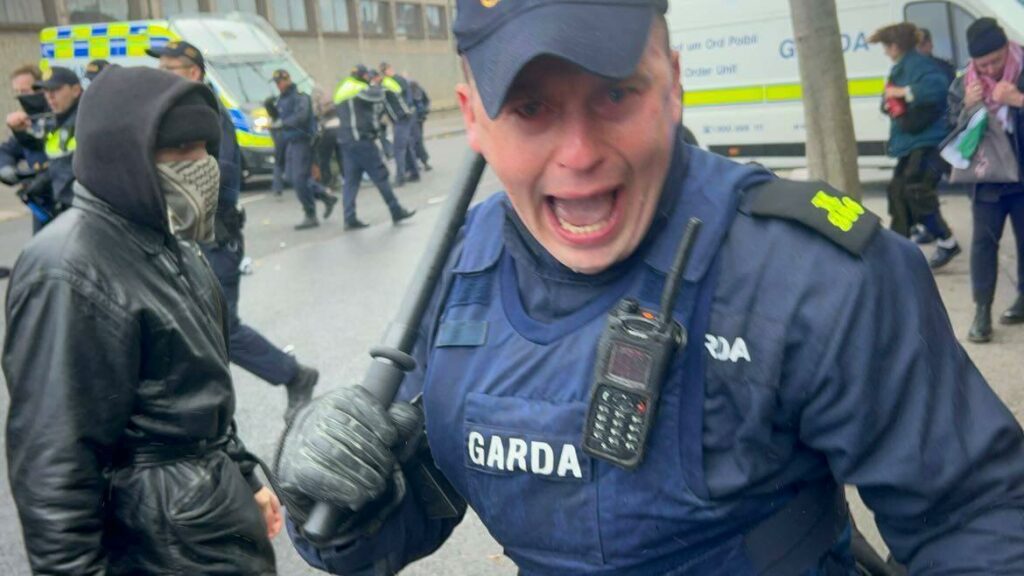
What is the future of the movement? In times of desperation, adventurism hangs above leadership as the sword of Damocles. The rupture with the moderate wing of the IPSC was a necessary step to broaden the field of possibility for the movement. Does it, however, have the endorsement of the majority of the factions within? While support for the port blockade undoubtedly grew from the first to the second, both in the doubling of numbers from 150 to 300 and the reception from onlookers, if people allow themselves to be intimidated by the violence of State forces, and refuse to further enjoin themselves to such acts of resistance, there will be a turn towards ultra-Maoist propaganda-of-the-deed, steeped in security culture, without widespread approval. This was raised by PBP members during the action, who fought bravely but were hesitant to throw in their full weight behind the tactical and strategical essence it represented. There was tension between those calling to break the Gardaí line, with debate over who holds the megaphones, and then, in individual conversation, the worry of adventurism reigned. This ties into the question of ‘politics’, the desire to create a mass base which can catapult the Left to power through the use of the right optics, aesthetics and fine-tuned policies, and which differs from ‘activism’. One thing is for sure: the workers’ movement, and their trade unions, need to be sparked into action for the sustainability of future mass disruption.
Attempted Dublin Port Blockade Met With Pepper Spray and Baton Charge
Alexander Rakhmetov
On October 4th, 2025 an attempt to block the Dublin port in solidarity with the Palestinian cause was met with a baton charge and pepper spray by the police.
This is the second attempt at blocking the port. The first was on the second of October, hastily planned in response to the interception of the flotilla. It was more calm, although some people were injured when the pigs forced the protesters to move.
The second blocking was planned in partial secrecy. The scheming was kept on the down-low to take the establishment by surprise. The day had started with an official sanctioned protest by the IPSC, a moderate liberal group. Our idea was to split off after crossing the river.
As the march kicked off, we started spreading the Good News amongst the marchers. An idea was made to have a second contingent break off after the main march concluded.
Worries existed because the far right was incidentally also protesting on our march’s path, but luckily no incidents occurred as it was delayed by a right-wing trip to the pub. An incident did occur, however, at the bridge where we broke off, as the IPSC stewards were incredibly angry at us for “splitting the movement”. Nobody bothered to tell them, it seems, that the establishment struggles more with multiple smaller protests, than one big one. In this, the seasoned alcoholics of the right accidentally helped us.
My contingent was part of the second wave. The first one had broken through two lines of pigs with as much difficulty as a butcher has using a cleaver (refer to Molnarfi’s article). An opening was found and they broke through. Water cannons, though present, stayed as dry as the cops’ wives.
The third line, alas, stayed firm. Fifteen minutes before my arrival a push was made and failed, as the cops covered the protesters in enough pepper spray to make a small Hungarian dish. As I stood before my comrades, I saw people rushing to and fro with eye wash, milk, and vinegar. Many people laid on the ground, aching and moaning in pain.
Just as our morale was waning, the contingent from the main march had arrived. We regrouped and planned what was to be done, which was a burning question at the time. We realised we couldn’t break the police line/pork skewer, so we decided to outmaneuver the horde of feral cops and march to a different port entrance.
The march there was calm. Almost every bystander and trucker we passed cheered us on. The mood was ecstatic. People hollered, danced, and sang as we neared the second entrance, until we saw a long line of riot police that awaited us.
However, unlike the Irish State, we were full of determination. We linked arms and pushed forwards. The cops pushed back with batons and pepper spray.
It is at this point that I must note to international readers that the police officers of An Garda Siochana are well-known for being lazy and unwilling to start fights if they don’t have to.
They did not live up to their reputation.
As we were still recovering from the pepper spray, they ordered us to disperse. Less than five minutes later, they raised their shields and batons and charged at the crowd of half-blind protesters who were armed with nothing but mobility aids, milk cartons, and a bag of onions (a Shrek (2001) reference).
One pig specifically singled out and chased one particular fellow, who was then beaten with a baton. Another accidentally pepper sprayed himself.
Many of us ran clinging on to someone, as we were still blinded by the spray. Two people were arrested in the chaos, they were released.
The garda column kept pushing us until the end of the street, where the hectic events of the day ended with wet wipes, eye wash, and frantic attempts to light a cigarette in the middle of a tropical storm.
The atmosphere following the interception of the flotilla has been one of tense anticipation. It is as if the air was full of fuel and awaiting a spark.
This day was a day of sparks. We must look ahead however, lest the fire burn out. We need more manpower and better protection. The IPSC had internal ruptures as many ignored the abuse of the stewards and followed us. This is promising, but not enough.
The next such protest will be a bifurcation point, a crossroads: either we gain momentum as people get radicalised in a mist of pepper spray and the co-opted movement for Palestine rises like a crimson phoenix, or the rout we suffered becomes permanent as fearful people stay home. Let us maintain the fire from which the phoenix will rise.
Appendix: Recorded Garda Badge Numbers
A38
H31
A227
G288
E230
G141
T214
T356
J194
A couple pigs were not wearing badge numbers. When Rakhmetov approached one of them asking for his badge number, he was told to move away or he would be pepper sprayed.
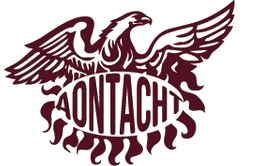
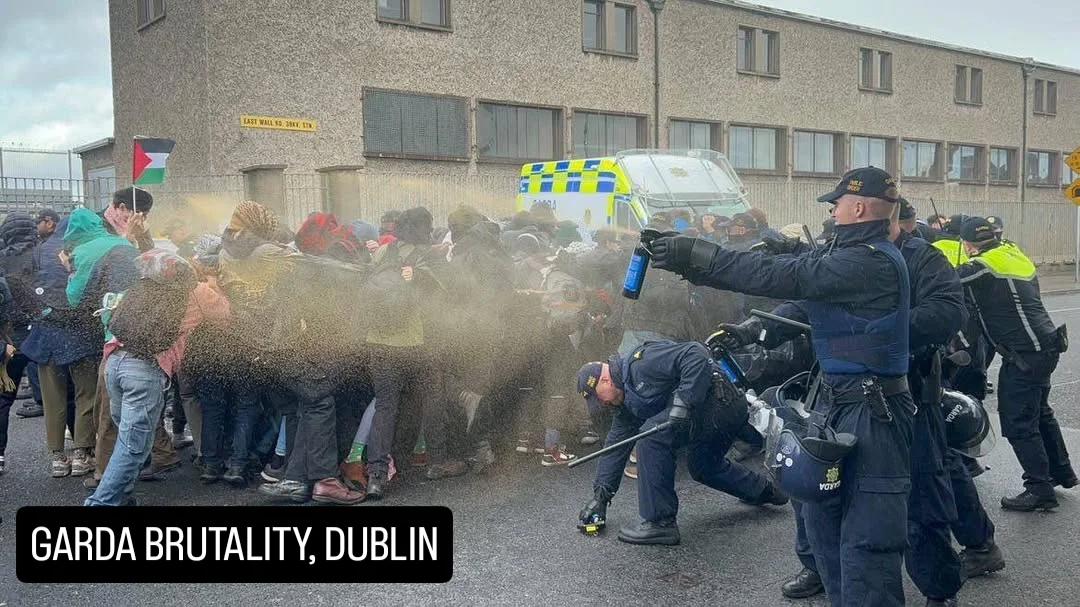
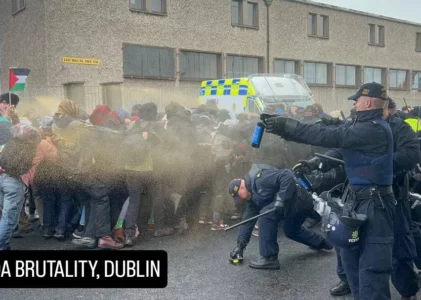
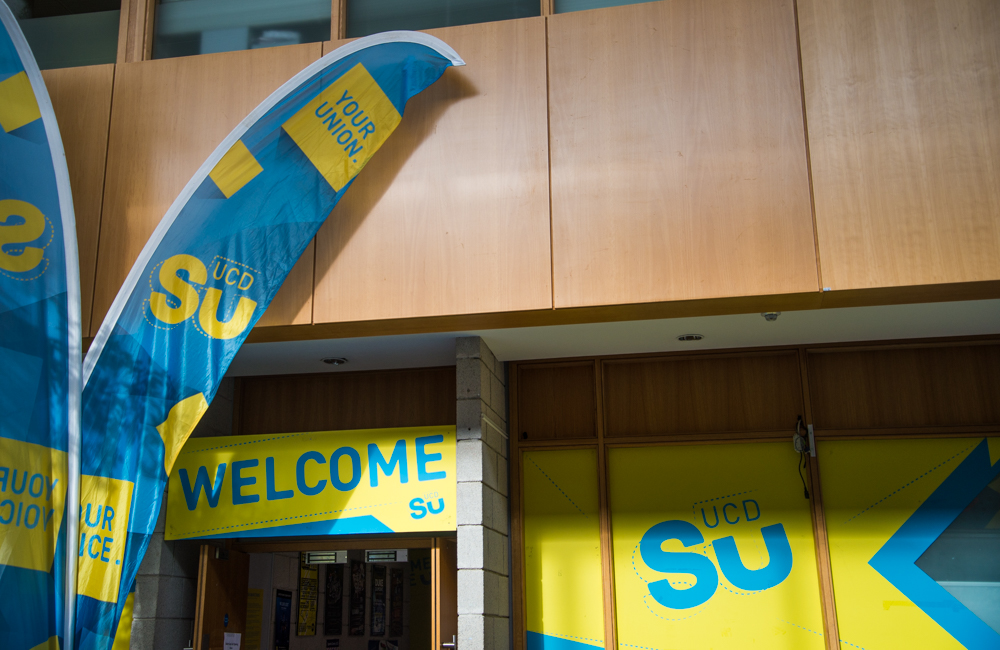
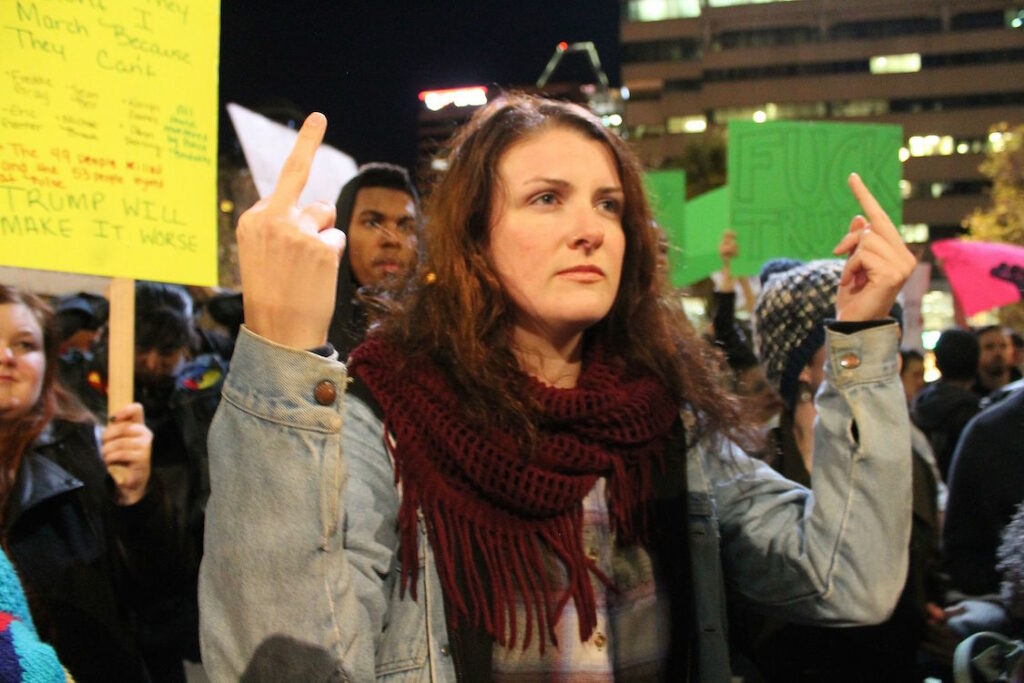
I was at the peaceful protests this Saturday the 4/10/2025 and I was strangled by the neck by a Garda and I could not breathe. I was also pepper sprayed twice at very very close range and my fave is still burning and my lips are burning. My hands and arms were burning for hours afterwards.
I am so upset that a Garda would choose to strangle me rather than go for my shoulders or waist.
I am horrified actually.
I am 5ft 3 and he was about 6fr tall.
This is just horrific.
Thank you for standing together